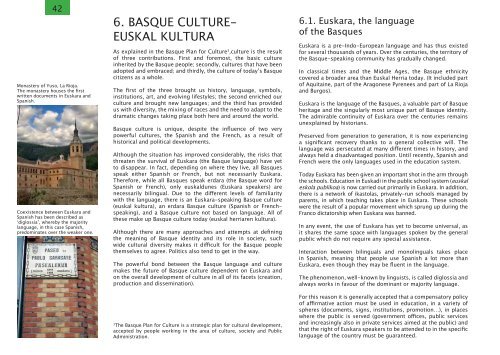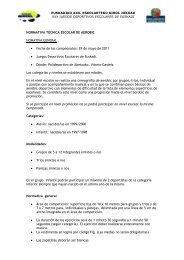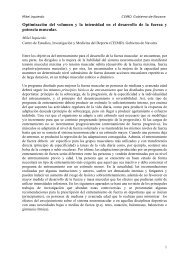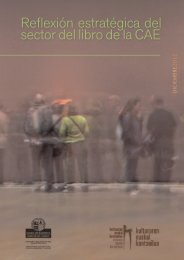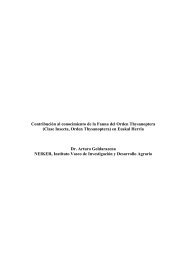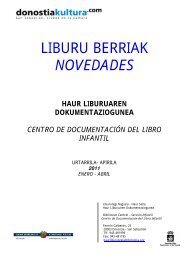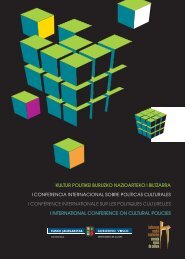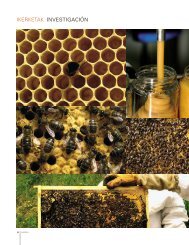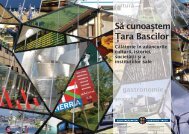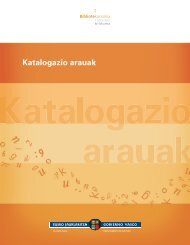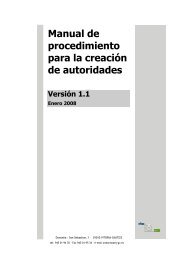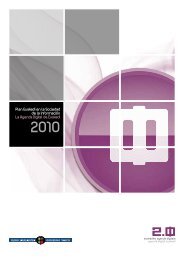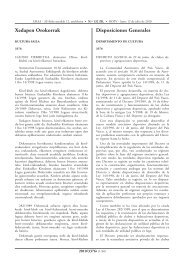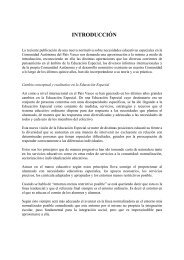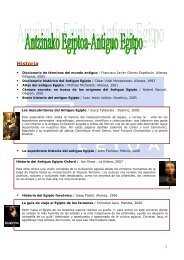The Basque Country (pdf, 4,3Mb) - Kultura Saila - Euskadi.net
The Basque Country (pdf, 4,3Mb) - Kultura Saila - Euskadi.net
The Basque Country (pdf, 4,3Mb) - Kultura Saila - Euskadi.net
You also want an ePaper? Increase the reach of your titles
YUMPU automatically turns print PDFs into web optimized ePapers that Google loves.
42<br />
Monastery of Yuso, La Rioja.<br />
<strong>The</strong> monastery houses the first<br />
written documents in Euskara and<br />
Spanish.<br />
Coexistence between Euskara and<br />
Spanish has been described as<br />
ʻdiglossiaʼ, whereby the majority<br />
language, in this case Spanish,<br />
predominates over the weaker one.<br />
6. BASQUE CULTURE-<br />
EUSKAL KULTURA<br />
As explained in the <strong>Basque</strong> Plan for Culture 3 ,culture is the result<br />
of three contributions. First and foremost, the basic culture<br />
inherited by the <strong>Basque</strong> people; secondly, cultures that have been<br />
adopted and embraced; and thirdly, the culture of todayʼs <strong>Basque</strong><br />
citizens as a whole.<br />
<strong>The</strong> first of the three brought us history, language, symbols,<br />
institutions, art, and evolving lifestyles; the second enriched our<br />
culture and brought new languages; and the third has provided<br />
us with diversity, the mixing of races and the need to adapt to the<br />
dramatic changes taking place both here and around the world.<br />
<strong>Basque</strong> culture is unique, despite the influence of two very<br />
powerful cultures, the Spanish and the French, as a result of<br />
historical and political developments.<br />
Although the situation has improved considerably, the risks that<br />
threaten the survival of Euskara (the <strong>Basque</strong> language) have yet<br />
to disappear. In fact, depending on where they live, all <strong>Basque</strong>s<br />
speak either Spanish or French, but not necessarily Euskara.<br />
<strong>The</strong>refore, while all <strong>Basque</strong>s speak erdara (the <strong>Basque</strong> word for<br />
Spanish or French), only euskaldunes (Euskara speakers) are<br />
necessarily bilingual. Due to the different levels of familiarity<br />
with the language, there is an Euskara-speaking <strong>Basque</strong> culture<br />
(euskal kultura), an erdara <strong>Basque</strong> culture (Spanish or Frenchspeaking),<br />
and a <strong>Basque</strong> culture not based on language. All of<br />
these make up <strong>Basque</strong> culture today (euskal herriaren kultura).<br />
Although there are many approaches and attempts at defining<br />
the meaning of <strong>Basque</strong> identity and its role in society, such<br />
wide cultural diversity makes it difficult for the <strong>Basque</strong> people<br />
themselves to agree. Politics also tend to get in the way.<br />
<strong>The</strong> powerful bond between the <strong>Basque</strong> language and culture<br />
makes the future of <strong>Basque</strong> culture dependent on Euskara and<br />
on the overall development of culture in all of its facets (creation,<br />
production and dissemination).<br />
3<br />
<strong>The</strong> <strong>Basque</strong> Plan for Culture is a strategic plan for cultural development,<br />
accepted by people working in the area of culture, society and Public<br />
Administration.<br />
6.1. Euskara, the language<br />
of the <strong>Basque</strong>s<br />
Euskara is a pre-Indo-European language and has thus existed<br />
for several thousands of years. Over the centuries, the territory of<br />
the <strong>Basque</strong>-speaking community has gradually changed.<br />
In classical times and the Middle Ages, the <strong>Basque</strong> ethnicity<br />
covered a broader area than Euskal Herria today. (It included part<br />
of Aquitaine, part of the Aragonese Pyrenees and part of La Rioja<br />
and Burgos).<br />
Euskara is the language of the <strong>Basque</strong>s, a valuable part of <strong>Basque</strong><br />
heritage and the singularly most unique part of <strong>Basque</strong> identity.<br />
<strong>The</strong> admirable continuity of Euskara over the centuries remains<br />
unexplained by historians.<br />
Preserved from generation to generation, it is now experiencing<br />
a significant recovery thanks to a general collective will. <strong>The</strong><br />
language was persecuted at many different times in history, and<br />
always held a disadvantaged position. Until recently, Spanish and<br />
French were the only languages used in the education system.<br />
Today Euskara has been given an important shot in the arm through<br />
the schools. Education in <strong>Euskadi</strong> in the public school system (euskal<br />
eskola publikoa) is now carried out primarily in Euskara. In addition,<br />
there is a <strong>net</strong>work of ikastolas, privately-run schools managed by<br />
parents, in which teaching takes place in Euskara. <strong>The</strong>se schools<br />
were the result of a popular movement which sprung up during the<br />
Franco dictatorship when Euskara was banned.<br />
In any event, the use of Euskara has yet to become universal, as<br />
it shares the same space with languages spoken by the general<br />
public which do not require any special assistance.<br />
Interaction between bilinguals and monolinguals takes place<br />
in Spanish, meaning that people use Spanish a lot more than<br />
Euskara, even though they may be fluent in the language.<br />
<strong>The</strong> phenomenon, well-known by linguists, is called diglossia and<br />
always works in favour of the dominant or majority language.<br />
For this reason it is generally accepted that a compensatory policy<br />
of affirmative action must be used in education, in a variety of<br />
spheres (documents, signs, institutions, promotion…), in places<br />
where the public is served (government offices, public services<br />
and increasingly also in private services aimed at the public) and<br />
that the right of Euskara speakers to be attended to in the specific<br />
language of the country must be guaranteed.


